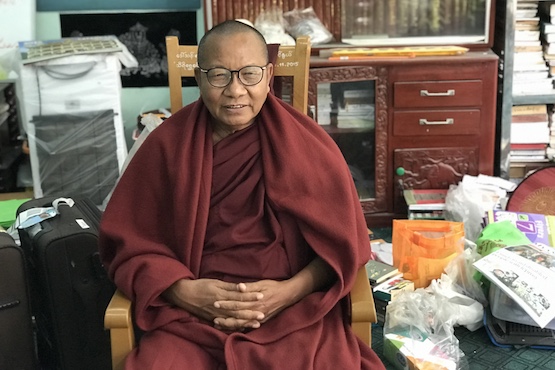State Sangha hears concerns about an increase in Buddhist nationalism and anti-Muslim rhetoric

Ashin Ariya Wun Tha Bhiwun Sa, known as Myawaddy Sayadaw, is seen in Myawaddy Mingyi Monastery in Mandalay on Feb. 23. (ucanews.com photo)
February 26, 2018
Buddhist monks and laypeople in Myanmar are demanding action against unruly monks who tarnish the image of religion in the Buddhist-majority country.
Ashin Ariya Wun Tha Bhiwun Sa, a Buddhist monk known as Myawaddy Sayadaw from Mandalay, said it is the duty of all monks to publicly criticize misbehaving monks and those who spread hate speech.
“Silence is like supporting [misbehavior], so we raise our voices. Open criticism of monks does not mean a divided community — it is an effort to maintain Theravada Buddhism,” Ariya Wun Tha told ucanews.com.
The monk, who is involved in interfaith activities and a public critic of hard-line Buddhist group Ma Ba Tha, said action is needed against monks who break rules and regulations.
He said the role of Ma Ba Tha is now dimming as it loses the support of monks and the public.
“We are fighting for the truth and will challenge nationalist monks openly so that their voices are not louder and the tone of nationalism is decreased,” said Ariya Wun Tha.
Religious Affairs and Culture Minister Thura Aung Ko has asked the top Buddhist body to step up action against unruly monks and novices who could stir up trouble in Myanmar.
“Some monks have been behaving irreverently against religious rules. It could tarnish the image of Buddhism and be dangerous for the religion, so I want to ask the State Sangha to take action against them,” Aung Ko said on Feb. 20.
The annual meeting of the State Sangha Maha Nayaka Committee (Ma Ha Na), the government-appointed council that regulates Buddhist clergy, was held in Yangon on Feb. 20-21.
The council’s 47 senior monks discussed the code of conduct and religious and educational matters.
Chairman Bamaw Sayadaw Bhaddanta Kumarabhivamsa stressed the importance of enforcing religious rules on monasteries, monks and novices.
Ashin Tayza Wuntha, a monk from Pe Pin Monastery in Mandalay, said he would wait and see if Ma Ha Na’s words become practical action.
“I don’t think the government will take harsh action as it could create unnecessary problems among the public and the monk community,” he told ucanews.com.
The monk said an ultra-nationalist monk, U Wirathu, is openly advocating nationalism by using harsh words and was receiving much criticism from the public.
Myint Swe, a Buddhist layperson and president of the Religions for Peace interfaith group in Yangon, said some monks were breaking religious rules.
“The government has a long-term strategy and has taken one step after another to curb hate speech and diminish the role of nationalists. In terms of religious affairs, it is sensitive, so the government appears to handle the situation carefully,” he told ucanews.com.
Myanmar has 520,326 registered monks, according to Warso Sangha statistics.
The State Sangha barred U Wirathu from preaching sermons for a year from March 10, 2017.
In protest at the order, U Wirathu taped his mouth shut as he attended a preaching ceremony in a village in Ayeyarwaddy division in March last year.
U Wirathu’s brand of extreme Buddhist nationalism and anti-Muslim rhetoric is a growing force in Myanmar society, where the Buddhist majority treats monks with high regard.
His anti-Muslim speeches helped to fuel riots that erupted across the country from 2013 to 2014.
U Wirathu has hailed the men accused of planning the assassination in January 2017 of Ko Ni, a high-profile Muslim lawyer, as defenders of Myanmar’s race and religion.
Brussels-based think tank International Crisis Group said in a report in September 2017 that while the Myanmar government must continue to take robust action against hate speech, incitement and violence, it is unlikely that confrontation and legal action will be effective in dealing with the broader phenomenon of Buddhist nationalism and groups such as Ma Ba Tha.
